Theological Failure to Recognize the Paraclete
For two millennia, Christian theology has awaited the fulfillment of Jesus’ promise—the coming of the Paraclete who would guide humanity into all truth. Yet when Shri Mataji Nirmala Devi fulfilled this prophecy through four decades of spiritual ministry, theologians remained silent. Jürgen Moltmann’s vision of eschatology as reconciliation is noble, but powerless without the Paraclete’s actual presence. The failure to recognize Her is not just an oversight—it is a betrayal of Christ’s promise. The time for waiting is over. The Paraclete has come. The door to salvation was opened. But theology refused to walk through it. Now, the future Christianity awaits will never arrive.
Steinfels highlights the rarity of the term "eschatology" in everyday discourse: "If you had read every word of this newspaper every day for the last five years, you would have encountered it fewer than 20 times." While fundamentalists focus on "final battles between good and evil, the coming of Jesus (or other messianic figures), the Last Judgment and the eternal assignment of the saved and the damned to heaven or to hell," liberal believers often dismiss these as "striking but disconcerting poetry."

Jürgen Moltmann, however, insists that eschatology is central to Christian theology, asserting that biblical revelation is grounded in divine promises rather than mere historical trends. He critiques the traditional image of the Last Judgment, stating, "The image of the God who judges in wrath has caused a great deal of spiritual damage." Instead, he envisions a "great Day of Reconciliation," where divine justice is not about retribution but "God’s creative justice," which restores victims and transforms perpetrators.
For 20 centuries, Christians have awaited the eschatological salvation that is the very foundation of their faith. The Last Judgment and the promise of eternal life through Christ have remained central tenets, yet their realization has been continuously postponed into an ever-receding future. Meanwhile, theological discourse, such as Moltmann’s, has shifted towards a reinterpretation of traditional doctrines, seeking to redefine divine justice, reconciliation, and salvation. While such reflections may be intellectually stimulating, they remain utterly powerless in delivering the salvation that Christ assured.
The Paradox of an Unfulfilled Hope
Moltmann’s forward-looking eschatology is ultimately a theology of deferral—one that insists upon an unfinished, ever-distant future while failing to consider whether the key event that Christians await has already transpired. Jesus explicitly foretold the coming of the Paraclete, the Comforter who would guide humanity into all truth (John 16:13). Yet, for Christian scholars, this remains a vague, undefined expectation rather than an event that has already taken place.

The reality, however, is undeniable. Shri Mataji’s ministry, which began in 1970 and spanned four decades, brought forth a direct experience of the Holy Spirit through Kundalini awakening, fulfilling the very promise of the Paraclete in both word and deed. Her revelation of Self-Realization, her emphasis on divine truth, and her transformative impact on countless lives testify to the fulfillment of Jesus’ prophecy. And yet, Christian theologians—including progressive voices like Moltmann—have categorically failed to engage with this reality.
Theology’s Greatest Betrayal: Denial of Fulfillment
This failure is not a mere oversight but a catastrophic abdication of theological responsibility. Theologians who continue to speculate about an unfinished future while ignoring the clear evidence of the Paraclete’s past and present work have, in effect, denied the very promise upon which Christianity rests.
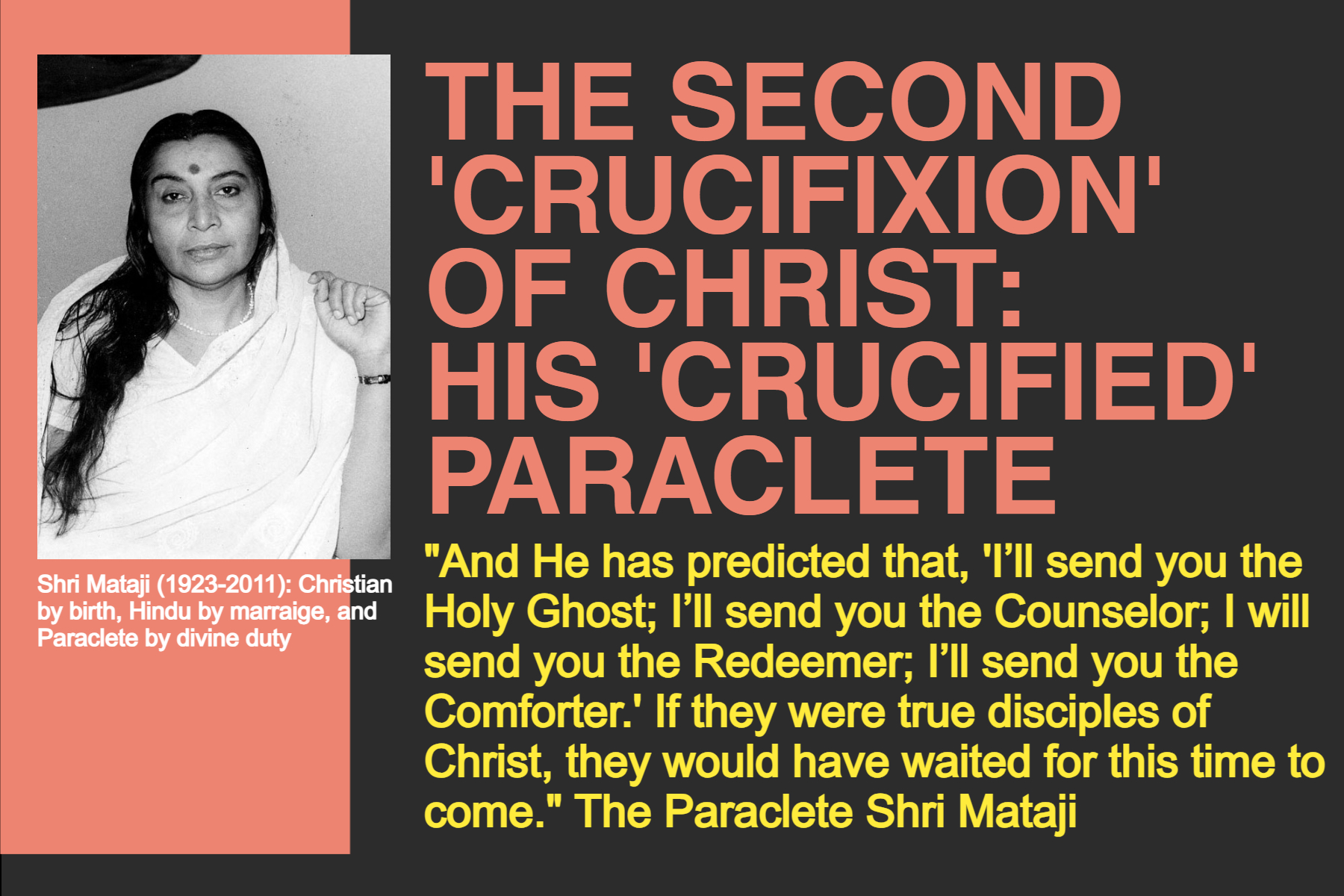
Moltmann critiques traditional eschatology for its punitive imagery and reimagines judgment as an embrace of love and reconciliation. Yet, what value does such a vision hold when theologians refuse to confront the reality that the means of achieving this reconciliation—the direct guidance of the Paraclete—has already been made available? Instead, Christian thought remains shackled to archaic doctrines, reluctant to venture beyond its own self-imposed limitations.
This intellectual stagnation is not simply an academic failure; it is a spiritual betrayal of Jesus Himself. By rejecting or ignoring the fulfillment of His promise, Christianity has effectively rendered itself obsolete, clinging to a future hope that is no longer relevant. The gift has been given; the door to salvation has been opened. But those entrusted with the theological stewardship of Christianity have failed to walk through it.
Conclusion: No More Hope, Only a Missed Destiny
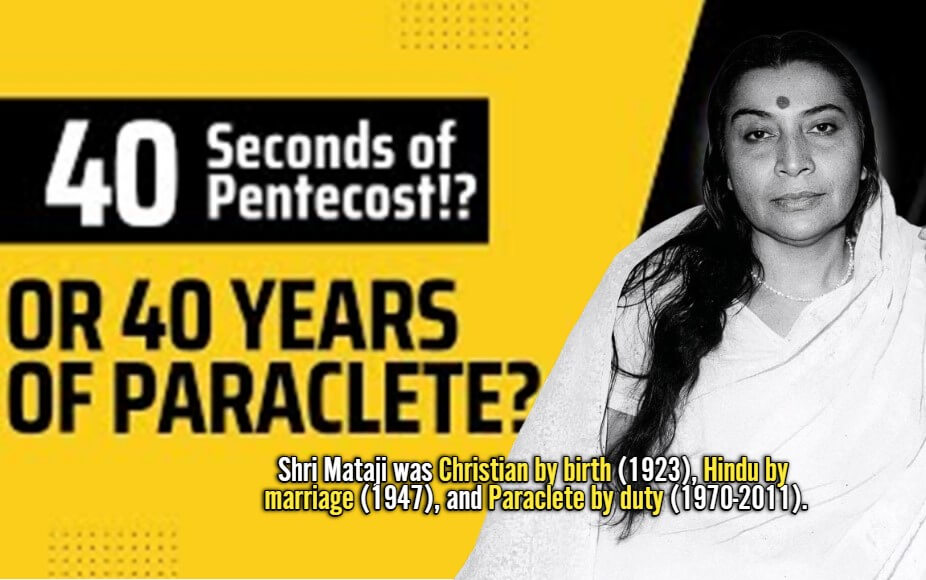
The implications of this failure are dire. If the Paraclete has already come and gone—if Shri Mataji’s four-decade ministry was indeed the manifestation of the Comforter promised by Jesus—then there remains no future fulfillment to await. The hope that Christianity has clung to for two millennia has already materialized, yet it has been left unrecognized and unacknowledged by those who should have proclaimed it.
This leaves us with an unassailable conclusion: Christian eschatology has collapsed under the weight of its own ignorance. The expectation of divine intervention in some distant future is a hollow delusion, a refusal to accept that the promise has been fulfilled and the opportunity squandered. The time for waiting is over; the time for recognition has passed. The Paraclete has come, fulfilled Her mission, and departed. Those who continue to wait for what has already occurred have condemned themselves to an eternity of spiritual blindness.
Thus, what remains for Christianity? Nothing but an empty shell of theological speculation, disconnected from the truth it was meant to uphold. Salvation was offered, and theologians refused to see it. Now, the promise stands fulfilled, but Christianity remains lost in the shadow of its own unfulfilled hopes—trapped in a future that will never arrive.
Pariah Kutta (https://adishakti.org)OpenAI. (2025). ChatGPT [Large language model]. https://chatgpt.com
Apokalypsis: The fulfillment of eschatological instruction by the Paraclete in the Age to Come promised by Jesus at the Last Supper

Paraclete Papers
PART ONE: An Investigative Report on Christianity's Greatest Cover-UpPART TWO: The Paraclete's Human Personality and the Theological Fallacy of Pentecost
PART THREE: The Greatest Deception in Human History: Pentecost as Satan's Trojan Horse
PART FOUR: Unveiling the Church Born from the Prince's Millennia of Deception
PART FIVE: Apokalypsis: Paraclete's Fulfillment of Jesus' Eschatological promise from Last Supper in Age to Come
PART SIX: The Paraclete and Pentecost: A Critical Analysis of Johannine Eschatology
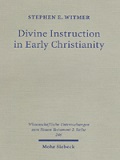 |
“I conclude the chapter by suggesting that the teaching of the Holy Spirit/Paraclete, because it is understood as the continuation of Jesus' teaching, is also regarded as the fulfillment of the promise of eschatological divine instruction.” Stephen E. Witmer Divine instruction in Early Christianity |
 |
“And when Jesus foreannounced another Comforter, He must have intended a Person as distinct and helpful as He had been. A breath, an afflatus, an impersonal influence could not have stood in the same category as Himself.” F. B. Meyer, Love to the Utmost |
 |
“There is something new and startling in both his person and his teaching that defies the categories provided by the world and culture in which he lived. It is clearest in all its radical nature in Jesus' insistence that in his person and activity God's decisive intervention was already present:” Francis Moloney, A Hard Saying |
 |
“The Paraclete has a twofold function: to communicate Christ to believers and, to put the world on trial.” Robert Kysar, John The Meverick Gospel |
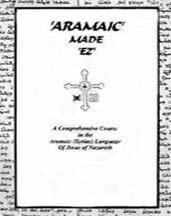 |
“But She—the Spirit, the Paraclete...—will teach you everything.” Danny Mahar, Aramaic Made EZ) |
 |
“Grammatical nonsense but evidence of the theological desire to defeminize the Divine.” Lucy Reid, She Changes Everything |
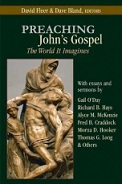 |
“The functions of the Paraclete spelled out in verses 13-15... are all acts of open and bold speaking in the highest degree.” David Fleer, Preaching John's Gospel |
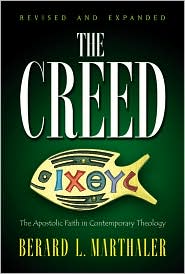 |
“The reaction of the world to the Paraclete will be much the same as the world's reaction was to Jesus.” Berard L. Marthaler, The Creed: The Apostolic Faith in Contemporary Theology |
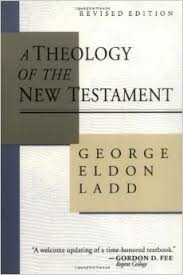 |
Bultmann calls the “coming of the Redeemer an 'eschatological event,' 'the turning-point of the ages.” G. Ladd, A Theology of the New Testament |
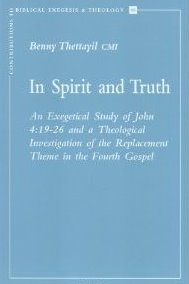 |
“The Paraclete equated with the Holy Spirit, is the only mediator of the word of the exalted Christ.” Benny Thettayil, In Spirit and Truth |
 |
“The divine Paraclete, and no lessor agency, must show the world how wrong it was about him who was in the right.” Daniel B. Stevick , Jesus and His Own: A Commentary on John 13-17 |
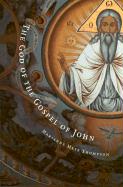 |
Stephen Smalley asserts that “The Spirit-Paraclete ... in John's Gospel is understood as personal, indeed, as a person.” Marianne Thompson, The God of the Gospel of John |
 |
“The Messiah will come and the great age of salvation will dawn (for the pious).” Eric Eve, The Jewish context of Jesus' Miracles |
 |
“The remembrance is to relive and re-enact the Christ event, to bring about new eschatological decision in time and space.” Daniel Rathnakara Sadananda, The Johannine Exegesis of God |
 |
“The Spirit acts in such an international situation as the revealer of 'judgment' on the powers that rule the world.” Michael Welker, God the Spirit |
 |
The Paraclete's “Appearance means that sin, righteousness, and judgment will be revealed.” Georg Strecker, Theology of the New Testament |
 |
“While the Spirit-Paraclete is the true broker, the brokers they rely on are impostors.” T. G. Brown, Spirit in the writings of John |
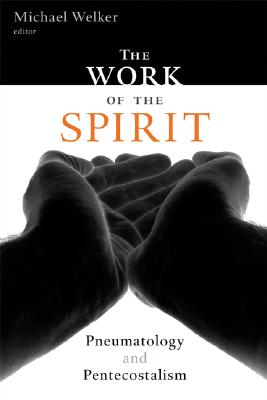 |
“The pneumatological activity ... of the Paraclete ... may most helpfully be considered in terms of the salvific working of the hidden Spirit.” Michael Welker, The work of the Spirit |
 |
“The pneuma is the peculiar power by which the word becomes the words of eternal life.” Robert Kysar, Voyages with John |
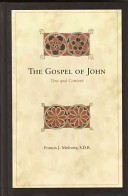 |
“The gift of peace, therefore, is intimately associated with the gift of the Spirit-Paraclete.” Francis J. Moloney, The Gospel of John |
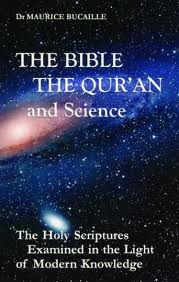 |
“Jesus therefore predicts that God will later send a human being to Earth to take up the role defined by John .i.e. to be a prophet who hears God's words and repeats his message to man.” M. Bucaille The Bible, the Qur'n, and Science |
 |
“This utopian hope, even when modestly expressed, links Jesus and the prophets to a much wider history of human longing.” Harvey Cox, The Future of Faith |
 |
“Because of the presence of the Paraclete in the life of the believer, the blessings of the end-times—the eschaton—are already present.” Robert Kysar, John |
 |
“They are going, by the Holy Spirit's power, to be part of the greatest miracle of all, bringing men to salvation.” R. Picirilli, The Randall House Bible Commentary |
 |
“The Kingdom of God stands as a comprehensive term for all that the messianic salvation included... is something to be sought here and now (Mt. 6:33) and to be received as children receive a gift (Mk. 10:15 = Lk. 18:16-17).” G. Ladd, A Theology of the New Testament |

